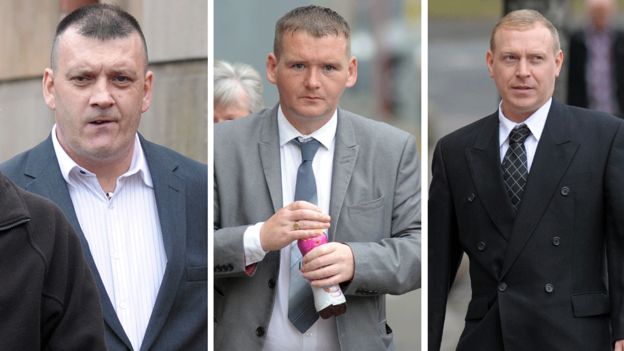The rule against double jeopardy, which is now stated in section 1 of the Act, prevents the prosecution of a person who has already been either convicted of, or acquitted of, an offence with the same offence or with any other offence arising out of the same acts. This can be set aside, on application to court, in certain limited circumstances, which are set out in sections 2-4. These are that the acquittal was tainted by the behaviour of either a juror or the judge (s.2); that the person acquitted makes an admission of guilt following the acquittal (s.3); or that new evidence has emerged which would substantially strengthen the case against the person acquitted (s.4).
 |
| Ronnie Coulter, Andrew Coulter and David Montgomery |
The tests to be applied to the new evidence are that it could not have been known to the Crown at the time of the original trial, that it should be reliable, that it should substantially strengthen the case against the accused. The Crown also had to demonstrate that it would be interests of justice to prosecute and that it would be possible to have a fair trial. In the case of this new evidence, the Court took the view that the evidence about the knives strengthened the likely case against Coulter and might allow a jury to consider that, even where he was known to have acted with others who were not on trial, that he was the one who struck the fatal blow. They accepted that the credibility and reliability of the evidence, particularly as it related to the admissions, would have to be tested, but that it was sufficiently robust to allow the application to grant permission for a new prosecution to proceed. Finally, in relation to the question of whether it was in interests of justice, the Court stressed that it was not desirable that an accused person should be able to boast that they had got away with committing the crime, and recommended prosecution on this basis.
What conclusions can we draw from this? At one level, I can imagine that the Appeal Court are quite relieved. By rejecting the applications against Andrew Coulter and David Montgomery they were gambling on the evidence being strong enough that a jury would conclude that he had been the one who stabbed Chhokar. This, it must be stressed, was far from clear cut, and his defence strategy in the trial was to attack the credibility of the witnesses and to blame the other men. If he had been acquitted we would have been back to the situation in 1999 where the defence of blaming each other (where the others were not on trial at the same time) led to their separate acquittals. This would have led to questions being raised about why they had proceeded against the men separately in spite of knowing that all three had been involved in the attack.
Does it tell us anything about the application of the provisions of the Double Jeopardy Act? In distinguishing between the applications against the three men, it seems clear that the Court recognised some sort of evidentiary threshhold. It is not just any new evidence that might trigger the exception to the principle of double jeopardy, as the evidence against Andrew Coulter and David Montgomery was considered too indirect. The Court also had a view on the the original trial, and the circumstances that led to the acquittal in judging what might be deemed to strengthen the Crown case. And finally, it has become very clear from this case that anyone acquitted of a serious criminal charge will be very ill advised to go around boasting that they got away with it...
No comments:
Post a Comment